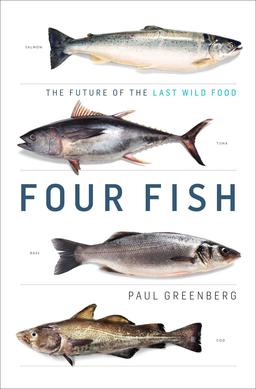Four Fish
Four Fish: The Future of the Last Wild Food is a book by author Paul Greenberg, published in 2010. The book delves into the state of the world's fisheries and aquaculture, focusing on four types of fish that dominate our menus and fishing industries: salmon, sea bass, cod, and tuna. Through these four species, Greenberg explores the broader issues of sustainable fishing, aquaculture (fish farming), and the future of ocean conservation.
Synopsis[edit | edit source]
Four Fish opens with Greenberg recounting his personal experiences with fishing and his growing awareness of the complexities and challenges facing global fisheries. He then takes the reader on a journey through the history, biology, and current state of each of the four fish species, using them as case studies to discuss larger environmental and economic issues.
Salmon[edit | edit source]
The section on salmon examines the impact of fish farming on wild salmon populations, the environmental consequences of aquaculture practices, and the efforts to create sustainable salmon fisheries. Greenberg discusses the challenges of balancing the demand for salmon with the need to preserve wild populations and habitats.
Sea Bass[edit | edit source]
In discussing sea bass, Greenberg explores the overfishing of wild sea bass stocks and the rise of aquaculture as a means to meet consumer demand. He highlights the challenges of farming sea bass, including the environmental impacts of fish feed and the difficulty of replicating the natural life cycle of sea bass in captivity.
Cod[edit | edit source]
The cod section of the book looks at the historical importance of cod fishing, the economic and cultural impact of cod overfishing, and the attempts at managing cod stocks. Greenberg provides a detailed account of the collapse of the North Atlantic cod fisheries and the lessons learned from this environmental disaster.
Tuna[edit | edit source]
Finally, the book addresses the issues surrounding tuna, focusing on the high demand for tuna in the global market, the practice of overfishing, and the challenges of managing tuna fisheries. Greenberg discusses the complexities of tuna life cycles, migration patterns, and the international efforts required to sustainably manage tuna populations.
Themes[edit | edit source]
Four Fish addresses several key themes, including the sustainability of fisheries, the impact of human consumption on marine ecosystems, and the role of aquaculture in meeting global seafood demand. Greenberg advocates for a balanced approach to fishing and fish farming, emphasizing the need for science-based management practices, conservation efforts, and responsible consumer choices.
Reception[edit | edit source]
The book received critical acclaim for its insightful analysis, engaging narrative, and comprehensive examination of the issues facing the world's fisheries. It has been praised for raising awareness about the importance of sustainable seafood and the challenges of balancing human needs with environmental conservation.
Conclusion[edit | edit source]
Four Fish serves as a compelling call to action for individuals, policymakers, and the fishing industry to work together to ensure the future of fish populations and the health of the world's oceans. Greenberg's work highlights the urgent need for sustainable practices in both wild fisheries and aquaculture to preserve the last wild food.
Navigation: Wellness - Encyclopedia - Health topics - Disease Index - Drugs - World Directory - Gray's Anatomy - Keto diet - Recipes
Search WikiMD
Ad.Tired of being Overweight? Try W8MD's physician weight loss program.
Semaglutide (Ozempic / Wegovy and Tirzepatide (Mounjaro) available.
Advertise on WikiMD
WikiMD is not a substitute for professional medical advice. See full disclaimer.
Credits:Most images are courtesy of Wikimedia commons, and templates Wikipedia, licensed under CC BY SA or similar.
Contributors: Prab R. Tumpati, MD

